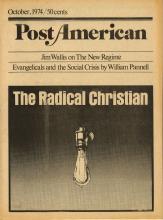The issue joined. I have chosen to speak about the present and the future of evangelical social concern. I do not find this an easy task. In the first place, what is an evangelical? I was tempted to define that word, but thought better of it.
Yet the question is a live one. I wrestled with it some years ago while watching two television programs. I had switched on the set, hoping to kill some time in a rather lonely setting in eastern Illinois. The TV, an ancient one, finally warmed to the occasion, and into view came a somewhat stiffly choreographed gaggle of young people singing the latest “with-it” religious tune. Then from the midst emerged a tall figure, handsomely dressed, who pointed his finger at me and announced, “Something good is going to happen to you!” His prophecy was fulfilled 30 seconds later when, on another channel, I viewed a remarkable CBS documentary on the amazing Brazilian archbishop, Dom Helder Camara.
Now both these men are called evangelicals, both represent discernible lifestyles consistent with their understanding of the gospel. Both accept Jesus Christ as the norm for discipleship. One reflects the affluence and influence of North American evangelism, the other the hard life of the peasantry and the oppressed.
Read the Full Article
To continue reading this article — and get full access to all our magazine content — subscribe now for as little as $4.95. Your subscription helps sustain our nonprofit journalism and allows us to pay authors for their terrific work! Thank you for your support.
Already a subscriber?
Login
